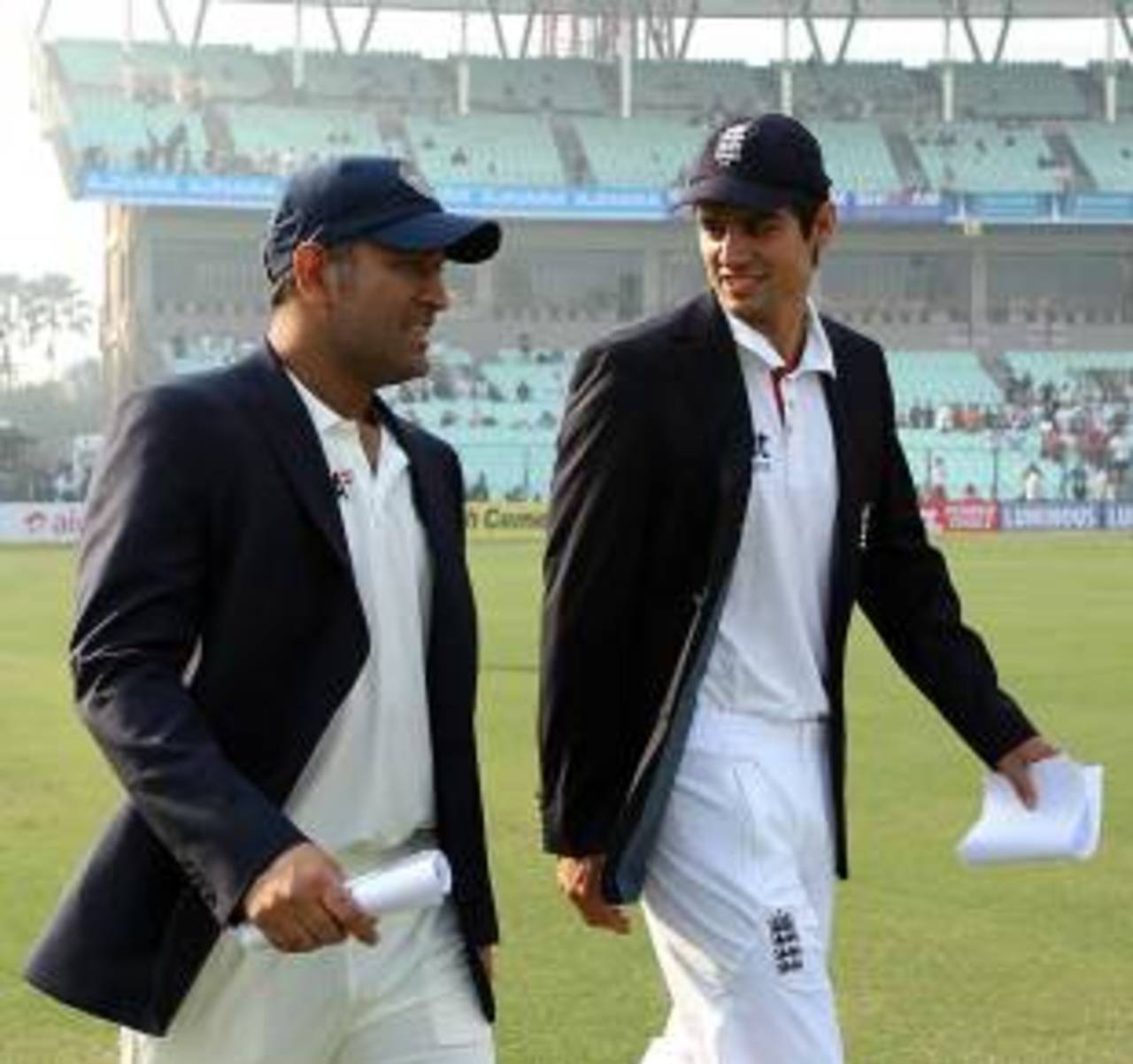Why Cook and Dhoni will struggle against Clarke
England's captain is too conservative and India's can't seem to bring his limited-overs aggression into the Test arena, so they are unlikely to beat Australia
Ian Chappell
Jun 1, 2014, 2:36 AM

Dhoni and Cook: no match for the ultra-aggressive Michael Clarke • BCCI
In reality, the degree of difficulty involved in captaincy lies somewhere between those who believe it's a mystery Sherlock Holmes couldn't unravel and the camp of great Australian legspinner Bill "Tiger" O'Reilly, who concluded: "My collie dog could captain a cricket team."
However two international captains, MS Dhoni and Alastair Cook - provided they retain their jobs - will soon face a task closer to the Holmes degree of difficulty. Both Dhoni and Cook will have a return bout with an opposing captain who handed them a drubbing, a whitewash, a hiding - take your pick which terminology you use - but whichever way you perceive the situation, it's the toughest task any captain faces.
The difficulty is created by the style of the opposing captain. As long as Michael Clarke's dodgy back holds out, Australia will commence both those Test series with a huge advantage.
Clarke's style is ultra-aggressive, with an attack to match, so he'll be prodding the opposition from the opening delivery of the series. In contrast Dhoni, at least in Tests away from home, is a captain who tends to be reactive rather than proactive. Clarke's style wins that contest every time.
Cook is ultra-conservative, and during the 5-0 drubbing in Australia, even when he had the opposition teetering on the edge of the cliff, he couldn't initiate the final shove. As much as anything, that's what frustrated Kevin Pietersen. He's an aggressive cricketer who likes to win and he could see England, unconvincingly led by Cook, had little chance of beating Australia.
It may well be that Pietersen had worn out his credits as a match-winner but it still makes little sense to cast aside your best batsman to bolster a captain who is out of his depth. At least out of his depth in a head-to-head battle with a captain like Clarke.
Supporters of Cook will say he can improve. While an important part of captaincy is learning on the job from your mistakes, there are certain critical things about the task that can't be learned. Aggressive intent and a positive approach can't be taught and Cook will be hard-pressed to acquire those innate qualities. He's unlikely to match Clarke in a contest where those attributes tilt the scales.
Dhoni is a slightly different case. He does have an aggressive streak as captain and it stands him in good stead in the shorter forms of the game. However, that trait seems to desert him in a Test series played away from his beloved home turf.
Dhoni's failings could be caused by a combination of things. Firstly, the short forms of the game virtually dictate how you should play, whereas in Test cricket, the captain has to establish a pattern and then attempt to impose his will on the opposition. Secondly, a captain can stay in the job too long. This leads to him becoming stale and adopting a more conservative approach.
It's going to be hard for India to beat Australia away from home. They don't possess the fast bowlers who are crucial to winning on bouncy pitches and there's a question mark over their batting under those conditions.
India may not win under another captain - most likely Virat Kohli - but they have no chance under Dhoni. On the last tour of Australia, India went downhill fast under his leadership and unless the injection of youth has an inspirational effect, I don't see Dhoni reversing that trend.
In Cook's case he has one advantage. His next meeting with Clarke will be on English soil. Nevertheless, it won't help Cook much as his team is short on match-winners with Pietersen's dismissal, and Australia's strong pace attack should be suited to English conditions.
The real problem for England is they have virtually no alternative choice for captain. Neither situation bodes well for India or England in a series where captaincy could make all the difference.
Former Australia captain Ian Chappell is now a cricket commentator for Channel 9, and a columnist